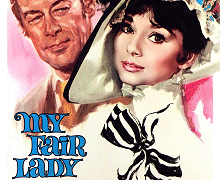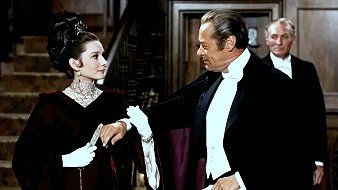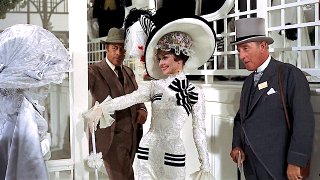


|
 |
|
| Casting
for the film adaptation of My Fair Lady began in 1962. Jay Lerner hoped
for Julie Andrews, who originally played Eliza on Broadway, to reprise her
role, but Warner Brothers studio head Jack Warner decided Andrews lacked
sufficient name recognition. Shirley Jones, Shirley MacLaine, Connie Stevens
and Elizabeth Taylor were also considered for the role but the part was
eventually played by the established film actress Audrey Hepburn, with the
bulk of the singing dubbed by Marni Nixon. As Warner later recalled, the decision was made for financial purposes, stating, "In my business, I have to know who brings people and their money to a cinema box office. Audrey Hepburn had never made a financial flop". Although playing a 21-year-old flower girl, Hepburn was actually 34 in real life. Other actors considered for the role of Henry Higgins were NoŽl Coward, Cary Grant, Rock Hudson, Peter OíToole, Michael Redgrave and George Sanders. When asked why he turned down the role of Professor Henry Higgins, Cary Grant said that his original manner of speaking was much closer to Eliza Doolittle. The musical was to have been called Lady Liza until Rex Harrison objected to a title based on the name of the female lead. The film, released on 21st October1964 in the United States (21st January 1965 in the UK) is based on the 1938 film adaptation of George Bernard Shaw's 1913 play 'Pygmalion'. It was produced by Jack L. Warner and directed by George Cukor, with music by Alan Jay Lerner and Frederick Loewe, originally written for the Broadway production in 1956. The original choice to direct this movie was Vincente Minnelli, but when he wanted too much money, the job went to George Cukor. |
 |
 |
Set
in Edwardian London in 1910, this is the story of Professor Henry Higgins,
played by Rex Harrison (who reprised his role from the Broadway stage show),
a snobbish phonetics expert, who boasts to his friend Colonel Hugh Pickering,
played by Wilfred Hyde-White, another phonetics expert, that he could teach
a Cockney flower girl to talk well enough to pass her off as a duchess.
He decides that Eliza Doolittle, played by Audrey Hepburn, will be the subject
of his experiment. After an initial period of hard work which sees them
all nearly giving up, Eliza eventually 'gets it' and proceeds to then rapidly
climb up the ladder of society. The inspiration for the library in Higgins' home was a room at the Ch‚teau de Groussay, Montfort-l'Amaury, in France. The opera that was playing on the night Higgins and Eliza meet in Covent Gardens was Faust. For Eliza's early appearances, Hepburn wore weights around her lower legs to make the flower girl appear gawky. The 'marbles' Higgins puts in Eliza Doolittle's mouth are actually grapes. Harrison, who had given up smoking, greatly disliked that his female co-star smoked three packs a day. A musical with memorable songs which include 'The Rain in Spain', 'I Could've Danced All Night', 'On the Street Where You Live' and 'Get Me to the Church on Time' was, at $17 million, the most expensive Warner Bros. movie produced at the time, but it went on to gross $72.7 million at the box office and became one of the top five most successful films of 1964. Rex won an Oscar for Best Actor with Stanley Holloway being nominated for Best Supporting Actor and Gladys Cooper, as Professor Higgins' mother, being nominated for Best Actress. The film won a total of eight Academy Awards including one for Best Picture. Ironically, Audrey wasn't even nominated for an Oscar for Best Actress which went that year to Julie Andrews for her role as Mary Poppins. In 2018, the film was selected for preservation in the United States National Film Registry by the Library of Congress. |
| Songs |
Cast | |||
|
"Overture" "Why Can't the English Learn to Speak?" "Wouldn't It Be Loverly?" "The Flower Market" "I'm An Ordinary Man" "With a Little Bit of Luck" "Just You Wait" "Servants Chorus" "The Rain in Spain" "I Could Have Danced All Night" "Ascot Gavotte" "Ascot Gavotte (Reprise)" "On the Street Where You Live" "Intermission" "Transylvanian March" "Embassy Waltz" "You Did It" "Just You Wait (Reprise)" "On the Street Where You Live" (reprise) "Show Me" "Wouldn't It Be Loverly" (reprise) "The Flower Market" (reprise) "Get Me to the Church on Time" "A Hymn to Him" "Without You" "I've Grown Accustomed to Her Face" "Finale" |
Andre
Previn and Orchestra Rex Harrison, Wilfrid Hyde-White and Audrey Hepburn Audrey Hepburn (dubbed by Marni Nixon) and Chorus Andre Previn and Orchestra Rex Harrison Stanley Holloway, John Alderson, John McLiam, and Chorus Audrey Hepburn (partially dubbed) and Charles Fredericks Mona Washbourne and Chorus Rex Harrison, Wilfrid Hyde-White, and Audrey Hepburn (partially dubbed) Audrey Hepburn (dubbed by Marni Nixon), Mona Washbourne and Chorus Chorus Chorus Jeremy Brett (dubbed by Bill Shirley) Andre Previn and Orchestra Andre Previn and Orchestra Andre Previn and Orchestra Rex Harrison, Wilfrid Hyde-White and Chorus Audrey Hepburn Jeremy Brett (dubbed by Bill Shirley) Audrey Hepburn (dubbed by Nixon) and Jeremy Brett (dubbed by Shirley) Audrey Hepburn (dubbed by Marni Nixon) and Chorus Audrey Hepburn (dubbed by Marni Nixon) and Ensemble Stanley Holloway, John Alderson, John McLiam, and Chorus Rex Harrison and Wilfrid Hyde-White Audrey Hepburn (dubbed by Marni Nixon) and Rex Harrison Rex Harrison Andre Previn and Orchestra |
Audrey
Hepburn Rex Harrison Stanley Holloway Wilfrid Hyde-White Gladys Cooper Jeremy Brett Theodore Bikel Mona Washbourne Isobel Elsom John Holland John Alderson Oscar Beregi Jr. Iris Bristol Buddy Bryan Jennifer Crier Henry Daniell Charles Fredericks Lillian Kemble-Cooper Alma Lawton Moyna MacGill Alan Napier Barbara Pepper Olive Reeves-Smith Baroness Rothschild Jacqueline Squire Victor Rogers Dinah Anne Rogers |
Eliza
Doolittle Professor Henry Higgins Alfred P. Doolittle Colonel Hugh Pickering Mrs. Higgins Freddy Eynsford-Hill Zoltan Karpathy Mrs. Pearce Mrs. Eynsford-Hill Butler Jamie - Doolittle's crony Greek Ambassador Flower Girl Prince of Transylvania Mrs. Higgins' Maid Ambassador King George V (Fantasy) Lady Ambassador Flower Girl Lady Boxington Gentleman Escorting Eliza Doolittle's Dance Partner Mrs. Hopkins Queen of Transylvania Parlour Maid Policeman First Maid |
|
All
original material is copyright
Other copyrights may also apply from images or material owners. |